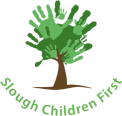Arbour Vale School (Special School)

Arbour Vale School is a vibrant and welcoming special school where we aim to provide a caring, safe and happy environment for everyone.
We:
- believe that all children should be able to achieve their full potential irrespective of their personal learning needs
- offer an individualised curriculum and ensure all of our pupils enjoy positive educational experiences.
At Arbour Vale we celebrate our pupils’ differences and ensure we have an inclusive school community.
Who to contact
- Contact name
- School Office
- Telephone
- 01753 515560 01753 515560
- office@arbourvaleschool.org
- Website
- Arbour Vale School
- Scan to visit this website
Where to go
- Name
- Arbour Vale School
- Address
-
Farnham Road
Slough
Berkshire - Postcode
-
SL2 3AE
Find SL2 3AE on a map
Childcare information
Funded places
- 3/4 year old funding
- Yes
- 2 year old funding
- No
Local Offer
- Contact name
- School Office
- Contact telephone
- 01753 515560
- Contact email
- office@arbourvaleschool.org
- Local Offer age bands
-
Early Years (0-4 years)
Primary (4-10 years)
Secondary (11-16 years)
Transitions to Adulthood (16+)
Schools extended Local Offer response
- Special Educational Needs policy
Arbour Vale School focuses on meeting the needs of all pupils with SEN, both collectively and individually.
We:
- are committed to providing a friendly atmosphere where pupils can have a sense of fulfilment, grow in confidence and above all make excellent progress and recognise and maximise the abilities they have
- believe strongly in working closely with parents and partners and welcome your contributions
- provide a high quality education, recognising and valuing the achievement of each individual
- believe in developing our pupil’s core skills with a particular emphasis on literacy and numeracy as well as developing skills for independent life
- provide our pupils with a wide variety of experiences in a stimulating and exciting learning environment. As a school we are very proud of our achievements in sport and PE, and creative arts.
- are a caring school and work hard to provide a safe and happy place where everyone feels valued.
SEN Policy
The school caters for 304 pupils with moderate, severe, profound and complex learning difficulties and Autism Spectrum Disorder from 2.5 – 19 years.
An increasing number of pupils have significant additional needs related to:
- behaviour
- medical issues
- sensory impairment or physical difficulties.
Pupils are registered within school based on primary and additional needs.
- Teaching and learning
What additional support can be provided in the classroom?
- The class size is small, and will vary according to the age and ability of the peer group.
- Class sizes are, typically, between 8-11 with a teacher and support assistants.
- There is a specialist provision within the school for pupils with ASD. This follows best practice for pupils with ASD, and includes pupils with a broad range of cognitive ability.
What provision do you offer to facilitate access to the curriculum and to develop independent learning?
- The curriculum is based on the National Curriculum but it is carefully adapted to ensure that pupils have the best possible chance of success.
- There is a focus on communication skills, literacy and numeracy as well as a range of subjects many of which are more practically based.
- We follow an age -appropriate themed curriculum which is based on topics in EYFS, Primary and KS3, this helps pupils both link their learning across the curriculum and consolidate knowledge.
- In KS4 and Post 16, pupils follow appropriate accredited courses in preparation for transition to college or work placements.
What ongoing support and development is in place for staff regards supporting children and young people with SEN?
- All staff have training to ensure that they understand how young people learn.
- We also ensure that all staff are able to identify any difficulties that young people have in relation to their SEN, and work with them to overcome these.
- Staff within the specialist provision within the school for pupils with ASD have training specific to this cohort of pupils.
- Staff work closely with health professionals including Occupational therapist, Physiotherapists, and School medical teams who provide annual training for all staff.
What arrangements are made for reasonable adjustments in the curriculum and support to the pupil during exams?
- All young people accessing external examinations are tested to see whether they are entitled to additional help during their exams. These are called Access Arrangements, and can include supporting pupils with scribes, readers, prompts and extra time.
- If they do qualify for extra support, this is always provided by staff who know the young people.
How do you share educational progress and outcomes with parents?
- Progress is regularly discussed with parents.
- We hold meetings to share targets and progress and achievements are sent home. Termly targets are shared. There is a report to celebrate progress at the end of each academic year.
- At the Annual Review of your child’s Education, Health and Care Plan, a detailed report is discussed and progress will always be discussed.
- For pupils under 5 there are six-monthly formal meetings to discuss the EHC Plan.
What external teaching and learning do you offer?
- The school uses a range of off-site providers; this can include local colleges, TVAP, Pit Stop and work experience placements.
- Off-site educational trips and visits are provided regularly for all pupils to support education on-site.
What arrangements are in place to ensure that support is maintained in "off site provision"?
- Some young people are given the opportunity to access education being provided by external agencies.
- We only use provision that we know have DBS and the pupils are usually accompanied by a member of the school staff.
What work experience opportunities do you offer?
- Preparing young people to move on to College or a job is very important to us. All Y11 and Y14 students go on work experience and our Post 16 students link regularly with local Colleges.
- Pupils are fully prepared for this beforehand with a series of workshops, and then regularly supported during the work experience by school staff.
- For pupils from whom external work experience placements may not be appropriate, placements are offered within school or a work based programme is planned. This will include visits to, and visits from local businesses.
- Identifying and assessing Special Educational Needs
- At Arbour Vale young people already have a EHC plan in place before joining the school in which needs are identified.
- However, through continual assessment further educational needs may be identified by staff and strategies are put in place to address these difficulties.
- The schools employs a range of professional to further support this process including an educational Psychologist, SALT, Sensory Consortium, and health professionals.
- Young people and parents are encouraged to let staff know if they are finding anything particularly difficult, or if further needs arise.
- Pupils with medical needs have a Health Care Plan.
- Pupils with additional behaviour needs have a Positive Handling Plan.
- Involving parents and children/young people in planning and reviewing progress
What arrangements are in place for review meetings for children with Statements or Education, Health and Care (EHC) Plans?
- All young people have a EHC plan. Parents and carers are always invited to the review process organised by the School. They have the opportunity to share concerns and alongside their child, help to write the targets.
- All pupils are supported to share their views of their progress and will prepare a power-point or poster for the meeting. The level of detail will depend on the age and ability of the pupil. A range of communication strategies are used to enable all pupils to participate fully in this process.
What arrangements are in place for children with other SEN support needs?
Arbour Vale School works closely with a range of professionals who support the young people who attend the school. These include staff from:
- Speech and Language service
- Child and Adolescent Mental Health Service (CAMHS)
- Physiotherapists
- Occupational Therapists
- School Nurse
- Sensory Consortium
- Educational Psychology Service.
How do you ensure that parents know “who’s who” and who they can contact if they have concerns about their child/young person?
- Parents will find that the staff team at Arbour Vale School are very friendly and are always on hand to help however they can.
- The class teacher is the first point of contact. Full staff lists of class staff and the Team Leader are shared at the beginning of each term.
Do parents have to make an appointment to meet with staff or do you have an Open Door policy?
- We aim to have very regular contact with parents.
- We will always make time to meet with parents, whether they have made an appointment or not.
How do you keep parents updated with their child/young person’s progress?
- Academic progress is reported to parents regularly.
- A full report will be sent out towards the end of the school year.
- Progress will also be shared at termly target setting meetings, annual review meetings and parent consultation meetings: teaching staff are always happy to discuss more specific progress with you at any point, if you have any concerns.
How can parents give feedback to the school?
- At the Annual Review meetings, and parents evening, parents have the opportunity to give the school feedback.
- Questionnaires and response sheets are sent out through the term to obtain parental views.
- If parents have concerns about their child they are encouraged to ring the school.
Do you have home/school contracts?
- These are part of our welcome information shared with new parents and set out the expectations of the partnership between parents and the school.
- Homework is discussed at Parents Evening and is agreed on an individual basis.
What opportunities do you offer for pupils to have their say such as school council
- We have a student council where pupils can discuss issues that are important to them.
- Each class has a representative on the council.
- Students are also on a pupil panel when there are interviews for staff as we value their opinion about who they would like to work with them.
What opportunities are there for parents to have their say about their son/daughter’s education?
- We welcome parents sharing their feelings about their child’s education.
- We have regular opportunities at target setting meetings, parent consultation meetings and at annual reviews although we are always happy for parents to talk to us in between these more formal opportunities.
What opportunities are there for parents to get involved in the school or become school governors?
- Parents are sometimes invited on educational visits and activities: if you are happy to be involved in this way, please let us know.
- We also hold regular coffee morning's and parental training where parents have met together socially and supported each other.
- Additional support
The 2014 Code of Practice sets out four main areas of need:
- communication and interaction
- cognition and learning
- social, emotional and mental health
- sensory and/or physical.
Arbour Vale School caters for pupils within all four areas of need. Many pupils have multiple and complex needs, requiring a highly individualised approach to their education provision. On the initial visit to school there is a discussion around your child's needs and the approaches to learning that may be used.
The following interventions provide a summary of the approaches used.
Access to a supportive environment.
- Specialist equipment, including IT, to access the curriculum where appropriate.
- Small class groups with high adult ratio.
- Purpose built facilities to provide a varied and practical approach to the curriculum.
- Prompt and reminder cards for organisational purposes.
- Visual picture strips or instructions to support behaviour or understanding of a task.
- Use of visual timetables.
Provision to facilitate or support access to the curriculum.
- Small group support from STA/CT.
- Breaking down of activities into small chunks.
- Repetition of instructions and key information.
- Use of specialist equipment such as seating, writing slopes or IT equipment.
- Visual/symbol support for learning activities.
- Use of Makaton to assist communication.
- Use of AAC to assist expressive language.
- Use of rapid prompting and facilitated communication.
Strategies to support and develop literacy.
- Consistent approach to developing phonic skills.
- 1:1 Intervention.
- Specialist support for pupils with specific difficulties with literacy.
- Frequent reading practice.
- Small group support in similar ability groups with guided teaching.
- Use of rapid prompting and facilitated communication approaches.
- Use of AAC and assisted technology.
Social Skills programmes/ support strategies to enhance self-esteem/ reduce anxiety.
- Social skills/self-esteem programmes for individual child or groups.
- Use of social stories to discuss events.
- Breaktime structured activities group to alleviate unstructured time.
- Individual focused STA playground support for some named children.
- Peer mentoring.
- Nurture group support.
- Social and Communication programmes in place - including social thinking.
Strategies/programmes to support Occupational Therapy/Physiotherapy Needs/motor needs/Sensory needs.
- Intervention programmes from an occupational therapist or physiotherapist.
- Provision of equipment advised by Occupational therapist.
- Activities from Slough Occupational Therapy toolkit.
- Handwriting and motor support including activities from occupational therapists.
- Intervention programmes and specialist 1:1 support from Sensory Consortium for VI/ HI and MSI.
- Specialist support from Occupational Therapists for Sensory Processing difficulties.
Strategies to support behaviour.
- Use of school’s behaviour policy, available on website.
- Use of praise, rewards and sanctions.
- Individual behaviour management programmes.
- Advice and support from Educational Psychologist and CAHMS.
- All staff have Team Teach training on positive intervention and de-escalation.
- Extra activities
- Do you offer school holiday and/or before and after school provision? If yes, please give details.
There is an after schools programme offering activities for pupils to participate in within school and community facilities. During the summer holidays, there is a holiday club offered through Slough's Short Break Schemes. There are also a Saturday morning activity club, which involves a local Dance Club that is based at the school, Breakfast Club, After school, Holiday Club - What lunchtime or after school activities do you offer? Do parents have to pay for these and if so, how much?
All lunchtime activities are free. There is a charge for after school activities and holiday clubs. - How do you make sure clubs, activities and residential trips are inclusive?
By ensuring that the activities are subsidised where possible, and that bursary support is offered if required, making phone calls to ensure that all parents are aware, ensuring that the activities chosen cater for the broad range of needs within the school. - How do you help children and young people to make friends?
This is at the heart of all we do. Staff encourage pupils to develop and sustain friendships by helping them develop their communication and social skills, giving them opportunities to work closely and constructively together, and modelling positive relationships throughout the school day. We encourage a community of tolerance and understanding and help our young people to develop their abilities to make friendships in a safe and secure environment. Helping our young people to develop into independent and successful individuals, both academically and socially is the core purpose of the staff team at Arbour Vale School.
- Do you offer school holiday and/or before and after school provision? If yes, please give details.
- Meeting social and emotional needs of children/young people
We believe that if young people are not happy and healthy they will not learn. We therefore make sure that young people’s needs are met as fully as possible. Staff are trained in child protection, moving and handling, team teach and first aid.
What is the school’s policy on administering medication?
- The school caters for a large number of pupils with complex medical needs, and many require daily medication.
- Staff are willing to administer regular and emergency medication, once provided with the appropriate training for the individual.
- There are clear procedures in place for record keeping of administration of drugs.
How do you work with the family to draw up a care plan and ensure that all relevant staff are aware of the plan?
- We work closely with the School Nurse and other medical practitioners to ensure detailed Care Plans are in place for all pupils requiring regular and emergency intervention.
- Care Plans are shared with all staff and a central record is kept.
- Up -dates are provided as and when needed, but at least annually.
- All staff are trained for individual pupils within their care.
What would the school do in the case of a medical emergency?
- If there was a medical emergency the School would follow the pupil's care plan and call 999 if required.
- In the case of an accident or unknown medical emergency 999 would be called and a member of staff would accompany the young person in the ambulance.
- Parents would be informed as soon as practically possible.
How do you ensure that staff are trained/qualified to deal with a child’s particular needs?
- There is a training programme in place to support staff: there is a comprehensive induction programme as well as regular Continual Professional Development training for all aspects of pupils personal and learning needs.
- There is a wealth of experience amongst the staff, including staff who have specialist experience/ knowledge and/or training in the specifics of SEN, such as Dyslexia, ASD, ADHD, MSI and more complex needs. In addition to this, the Educational Psychologist will hold solution-focussed strategy meetings which both share good practice and help find effective strategies for pupils maybe causing concern.
Which health or therapy services can children access on school premises?
- There is a range of support available to support young people and their families including the school nursing team, who support the school with Health Education, including Sex Education and any other health issues or concerns.
- Physiotherapy, Occupational Therapy and Sensory Consortium are on site through the week.
- The Paediatrician and dietician hold medicals at school.
- Keeping up to date with knowledge and skills
- Our recruitment policy ensures that when staff are employed by the school, they come with experience, aptitude and skills which are needed to work with young people with SEN.
- In addition to this there is an induction programme which all staff are required to undertake. This training ensures that staff are aware of the correct safeguarding procedures and the management of pupils SEN, including challenging behaviour, as well as approaches to teaching and learning for pupils with SEN.
- Throughout the year, the school also has a range of training opportunities to ensure that all staff are kept up to date with their knowledge and understanding of SEN.
- A range of professionals are invited in to school to share their expertise as well as well as ‘in-house’ training and the sharing of outstanding practice across the College.
- There is a comprehensive CPD programme available to all staff. Further professional qualifications are encouraged.
- Transitions
Pupils can start at Arbour Vale School at any point during their school career, and careful thought is given to transition to ensure it is successful for the pupil and their family.
Transition plans can include:
- an admission meeting prior to the pupils start date
- accompanied visits to school to become familiar with the building
- home visits, especially for pupils starting in EYFS, Primary or with complex needs
- visits to current settings by key staff
- attendance at Annual Reviews and TAC meetings
- transition visits to work alongside peers
- photo books/ Social Stories of key staff and peers
- induction day for new Year 7 pupils.
What support is offered for young people leaving the school? (such as careers guidance, visits to colleges, apprenticeships, supported employment etc)
- Pupils get advice from the SEN PA from year 9 until the age of 25 years old.
- Annual Reviews are an opportunity to plan with the young person and their family the variety of options for post-16 and post-19 provision.
- Local colleges and other voluntary agencies attend parents evenings so advice is accessible and available.
- Special Voices also provide a range of information and expertise for families.
- We recognise the challenges that unstructured times can present to many of our pupils. We therefore have arrangements in place during the day.
What handover arrangements will be made at the start and end of the school day? Do you have parking areas for pick up and drop offs?
- Most young people who attend AVS are brought to and from school by a taxi, although some are brought by parents.
- There are clearly marked primary and secondary drop off and collection points for parents where staff will be waiting for the pupils.
- When pupils arrive on transport they are collected from the bus or taxi by Arbour Vale staff and we support them to the transition to their transport at the end of the day.
What support is offered during breaks and lunchtimes?
- There is a range of activities available to young people at break times and lunch times.
- Playground areas are closely supervised by staff.
How do you ensure my son/daughter stays safe outside the classroom? (such as during PE lessons and school trips)
- All activities are risk assessed and staffing ratios are regularly reviewed.
What are the school arrangements for undertaking risk assessments?
- There are risk assessments in place for each pupil and for all activities/learning environments. These are completed by class based staff and are then checked by the Line Manager and the Health and Safety Officer.
Where can parents find details of policies on bullying?
- Policies can be found on Arbour Vale School website and we will give hard copies to anyone who wants to.
- Parents and carers are encouraged to come in to school if they have any concerns about their child being bullied.
- Helpful contacts
- School Office - email office@arbourvaleschool.org.
- Check Arbour Vale School website.
Last updated
Last updated - .
Disclaimer
This information has been collected from third party providers. Slough Information and Services Guide and Slough Borough Council cannot accept responsibility for the accuracy of this information and recommend that parents, carers, young people, residents and professionals check with providers regarding DBS (Disclosure & Barring Service), OFSTED and CQC registrations.





